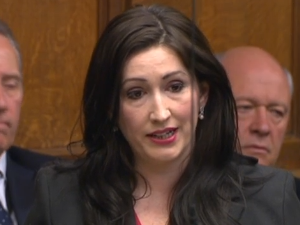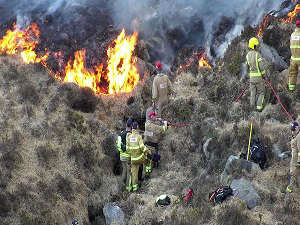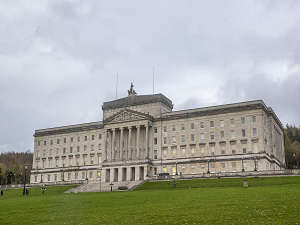
By Jennifer McKiernan and Alain Tolhurst
A call for direct rule for Northern Ireland has been made during a budget debate in the House of Commons.
DUP MP Emma Little-Pengelly (Belfast South) asked when Westminster would decide direct rule was "necessary", now Northern Ireland has been without a functioning executive since January 2017.
She asked the question as MPs were debating the Northern Ireland Budget (Anticipation and Adjustment) (No. 2) Bill at Westminster.
Mrs Little-Pengelly said: "At which point will the Secretary of State accept this is an entirely unsustainable position?
"The people of Northern Ireland are in a really difficult position, (with) Sinn Fein boycotting the Northern Ireland Assembly ... and the Secretary of State and this Government is refusing to put in place a direct rule, which, though not desirable, is necessary.
"We are now into several years of this type of process - there's no scrutiny, no democratic accountability - when is that going to change?"
Northern Irish Secretary Karen Bradley said she would not be moving to direct rule.
She said: "We are in a very unsatisfactory position and I would rather we were not doing this this way.
"But in order to ensure public services continue to be delivered and in order to ensure civil servants in Northern Ireland do have the statutory underpinning they need for the spending, that is why we are taking this budget Bill."
DUP MP Gavin Robinson (Belfast East) said there was "no need" for an emergency Bill, asking "when in the last two months has there been any genuine prospect of the Assembly being restored" to necessitate the Bill being fast-tracked.
Ms Bradley responded: "We have to be aware of the constitutional precedents that are set by changing the way we scrutinise these Bills...
"What I want to see is those politicians in Northern Ireland doing the right thing, coming back into Stormont, forming the executive so that all of those proper processes can be applied.
"But I don't think we should kid ourselves there is some sort of substitute arrangement that is going to offer a different approach - we have to see devolved government restored in Stormont."
Ms Bradley admitted that budgets being set from Westminster would lead to "perverse outcomes" for the people of Northern Ireland after a Labour MP raised the issue of childcare.
Jess Phillips (Birmingham Yardley) said she had recently been to visit and was "shocked" to find out free childcare was not available, and there was nothing in the bill allocated to spend in that area.
Ms Bradley said the allocations "are in line with the advice from the Permanent Secretaries as to the monies they need".
But she added: "That leads to perverse outcomes, that leads to things not being as we would like them in Northern Ireland.
"It leads to differences in Northern Ireland, it leads to the end of programmes that we may otherwise have wanted to see continue, but without a minister to direct that, those programmes do finish."
She said the answer is "devolved government in Northern Ireland", adding "there is no alternatives".
The DUP's Mrs Little-Pengelly also raised the issue of a lack of money for childcare, saying the planned rollout of the Government's flagship 30 hours of free care policy had stalled without the Assembly sitting.
She said: "There cannot be a decision on 30 hours free childcare, despite all of the work in the department, because there is no minister there to take it."
Shadow secretary of state for Northern Ireland Tony Lloyd said he did not want to see direct rule, adding: "We simply can't allow this vacuum to continue in this way, decisions are not being made."
He said the "hope is in a restoration of the Stormont structures because if we give up on that we're giving up actually on at least the principle of what the Good Friday agreement delivered".
Mr Lloyd said: "We've got to see a lot more concerted effort to get people round the table to try to break that log jam.
"If we start waving the spectre of direct rule at this point then we are saying that we're giving up on power-sharing."
The Bill cleared all stages and will undergo further scrutiny in the Lords at a later date.


 Firefighters tackle wildfire near Glenshane Pass
Firefighters tackle wildfire near Glenshane Pass
 Thousands march to derelict Casement Park to demand its redevelopment
Thousands march to derelict Casement Park to demand its redevelopment
 PPS to consider any basis for appeal against Oliver MacCormack sentence
PPS to consider any basis for appeal against Oliver MacCormack sentence
 Working group to assess impact of trade tariffs on Northern Ireland businesses
Working group to assess impact of trade tariffs on Northern Ireland businesses
 Drugs worth £860,000 seized following search in Kilkeel
Drugs worth £860,000 seized following search in Kilkeel